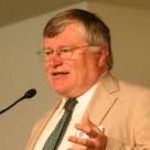
Quotes by Gene Edward Veith
Appeals to biblical morality, to the constitutional rights to life, to scientific facts about the development of life in the womb, to the brutality of abortion techniques – these objective issues carry no weight with people whose worldview allows for no external absolutes, who accept no moral criteria beyond a woman’s arbitrary choice, or who uncritically accept orthodox feminist party line.
Postmodern times: A Christian Guide to Contemporary Thought and Culture, Crossway, 1994, p. 147.
True Christianity…resists cultural captivity. It posits a transcendent moral law that is above and beyond human laws and customs, giving a framework by which cultures can be judged. In doing so, trans-cultural Christianity has managed to shape and transform human cultures.
Gene Edward Veith Spontaneous Compassion, Tabletalk, November, 2008, p. 82. Used by Permission.
One of the greatest paradoxes in Christian history is that the church is most pure in times of cultural hostility. When things are easy and good, that is when the church most often goes astray. When Christianity seems identical with the culture and even when the church seems to be enjoying its greatest earthly success, then it is weakest. Conversely, when the church encounters hardship, persecution, and suffering…then it is closest to its crucified Lord, then there are fewer hypocrites and nominal believers among its members, and then the faith of Christians burns most intensely.
But we would do well to think of ourselves in the same way we used to think about the lost people of the mission field. We have become the new heathen. We Americans are the ones now in thrall to primitive superstitions, such as believing in the power of positive thinking and having faith in ourselves. We are the ones held back by a materialistic worldview that has little conception of the supernatural. We are the ones with brutal customs, such as aborting our infants, neglecting our children, and abandoning and sometimes euthanizing our elders. We have simple, pounding music, and we are uneducated about the realities outside of our tribe. With our limited mind-set, we have trouble grasping the truths of Scripture.
Gene Edward Veith Spontaneous Compassion, Tabletalk, November, 2008, p. 82. Used by Permission.
Today’s postmodernists use cultural pluralism as a pretext for relativism, as if the existence of many cultures implied the existence of many truths.
Sex has been designed by God for His miraculous work of creating new human beings, each with an immortal soul. The physiology of sex in every detail works to engender new life. The emotions of sex exist to bring a man and woman together to constitute a family. Yes, sexuality is distorted by the Fall, so that lust and fornication can work against God’s purposes and be tainted by sin, but God’s created order remains.
Pragmatism is another non-Christian philosophy that has found its way into the church. Since we can never know what is true or good, according to pragmatist philosophers, we should simply do “what works,” conceived of in material terms. This is an important strain of American philosophy, from the modernist John Dewey with his atheism and socialism to the postmodernist Richard Rorty with his relativism and leftist politics. Few Christians would agree with these philosophers if they listened to them, but simplified pragmatism can be heard constantly in church committee meetings, church-growth seminars, and books for pastors. “What works” — to increase church attendance, attract non-Christians, bring in more money, or achieve another goal — can trump all theological, historical, and biblical considerations.
By first listening to those we are trying to reach, we can avoid giving pat, canned, impersonal answers. Instead, we can address them personally, authentically, and soul to soul. If they sense we are truly listening to them, they may grant us a hearing. They will feel that we have earned the right to be heard.
Christians are to be in the world, but not of the world, positively living out their faith in their various vocations in the “secular” realm and influencing it for the good, while remembering that their ultimate citizenship is in heaven.
One would think that [persecution] would be an obstacle to church growth when joining the church meant a death sentence. And yet, the age of persecution was the greatest period of church growth in history.
